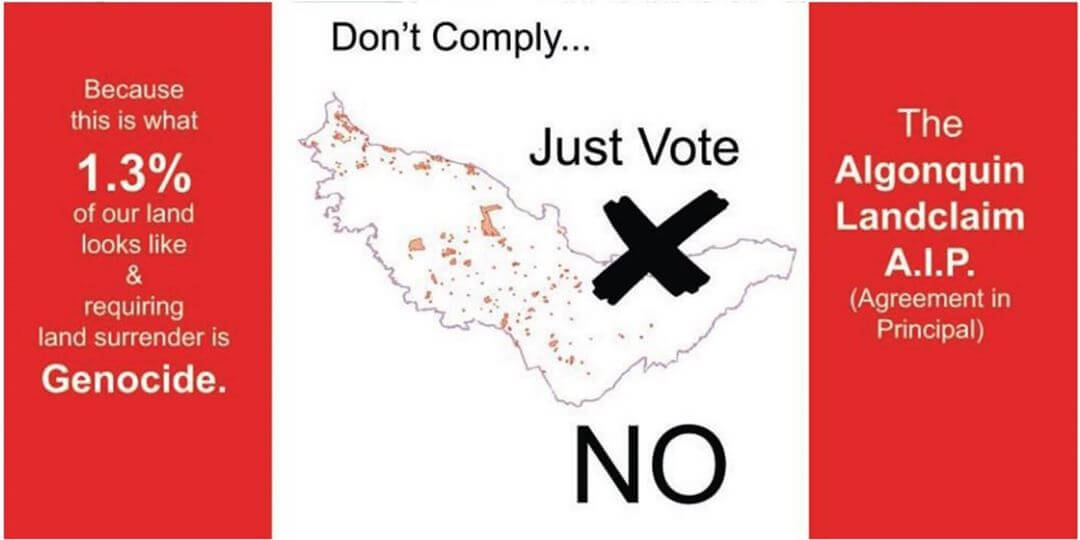
Did you know that Parliament Hill, where the Canadian government conducts its business, sits on Algonquin land which was never surrendered or ceded?
Same goes for the Supreme Court of Canada, and in fact most of the national capital in Ottawa. There are also other major developments proposed for the Chaudière Island and LeBreton Flats, and these sites have underlying title meaning it is the Algonquins who are the rightful owners of these lands.
Our communities are part of the Algonquin Nation, whose traditional territory includes the entire Ottawa River watershed. Its traditional territory straddles what is now the provincial boundary between Ontario and Quebec. Our First Nations are descended from the Algonquin Bands who traditionally used and occupied the territory where we still live. Our members can trace their ancestry and continued use and occupancy to time immemorial. The imposition of this boundary has had dramatic impact on our communities, one that continues to today
Starting at the end of this month, a vote will take place on a proposed Agreement-in-Principle by the so-called “Algonquins of Ontario” (AOO). The AOO claim covers about 3.6 million hectares stretching from Algonquin Park east to Hawkesbury, Ontario, including Ottawa, and down into territory near Kingston. If finalized, the deal would see $300 million in capital funding and 47,550 hectares of Ontario Crown land transferred to the AOO.
On their own, those figures might seem significant. But they are a drop in the bucket when you consider the size and importance of the land at stake.
There are a total of 10 groups that make up part of the AOO claim, but only one, Pikwakanagan First Nation, is a recognized band under the Indian Act and a historical community with an “ancestral connection to the territory.” There are huge problems with loose eligibility rules that appear to allow thousands of individuals with little or no connection to the Algonquin Nation to vote on the land claim. This is not about “status” against “non-status” — anyone who knows Kebaowek First Nation and the history of the Kipawa area will understand that. People who have a legitimate connection to the Algonquin nation and are recognized as members of a community are not a problem. The real problem is that there are potentially thousands of individuals who have taken advantage of loose eligibility rules to latch onto this land claim when they have no right. That is the problem.
The settlement has been negotiated behind closed doors with an organization — the Algonquins of Ontario — that is a policy fiction created by the Ontario and Canadian governments. We view the AOO process as a flagrant attempt to undermine and extinguish our First Nations rights, interests and title to unceded territories in Ontario.
The process has been completely unfair and has excluded most Algonquins. The AOO AIP is intended to set the stage for the extinguishment of Aboriginal title in the Ottawa Valley including the City of Ottawa. Large portions of the area under negotiation are subject to existing rights and interests held by other members of the Algonquin Nation
This deal threatens to divide our nations and our collective territory by employing an unethical and potentially illegal process which affords to individuals with questionable lineage and dubious rights to the land the right to vote and extinguish title, setting a dangerous precedent for our future First Nation negotiations.
This group does not have the legal or moral authority to negotiate away land or rights that are inherent to all Algonquin peoples. There are grave concerns about the legitimacy of the people being allowed to vote on the AOO AIP, less than 10% are members of a recognized First Nation. There should be serious doubts about the legitimacy of any vote that relies on thousands of “instant Algonquins.”
The legal landscape has shifted since this settlement was first cooked up. Court decisions like the landmark 2014 Tsilhqot’in ruling have changed the game with greater recognition of Aboriginal title. We, the Algonquins, have Aboriginal title and we should be ensuring that recognition.
The election of the new Liberal government may also change the playing field if they are true to their promises to:
If you agree that it is past time for the Canadian government to meet these basic obligations and recognize Indigenous rights, please spread our message by sharing this post, and inviting friends and family to ‘Like’ our Facebook page: https://bit.ly/infoforalgonquins

Indigenous Peoples are putting their bodies on the line and it's our responsibility to make sure you know why. That takes time, expertise and resources - and we're up against a constant tide of misinformation and distorted coverage. By supporting IC you're empowering the kind of journalism we need, at the moment we need it most.